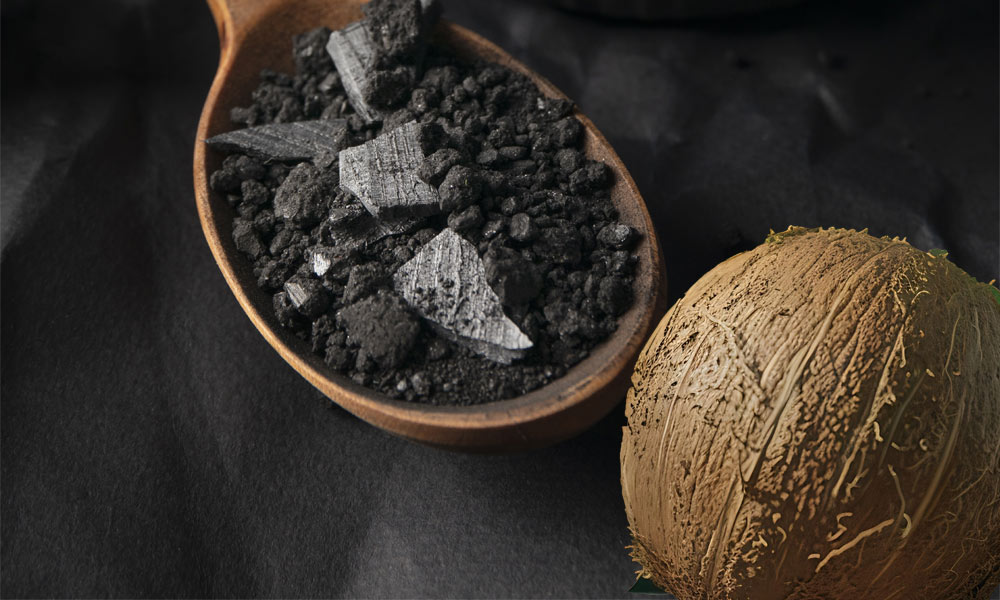
Activated carbon is an incredibly versatile purification agent used across the globe in various industries. The large surface area, porous surface, and high adsorbent capacity have made activated carbon an irreplaceable part of industries that have sustainable purification practices. Water treatment, gas purification, medicinal use, food and beverages, pharmaceuticals, and alcohol purification are some of the most well-known industries that use activated carbons for their unique properties. Based on the production method and raw materials used, activated carbon can be produced for special applications.
Wood, coconut shells, lignite, coal, and bamboo are some of the raw materials used to produce activated carbon industrially. Among these varieties, coconut shell activated carbon is reputed to be much more expensive. Why is that? In this article, we are going to discuss the factors that make coconut shell activated carbon different and more expensive than other varieties, such as coal-based activated carbon.
Coconut shell activated carbon
Activated carbon is a very efficient adsorbent that can remove a huge range of impurities from water and gas; thus, it is used in countless industries and processes for the purification and extraction of certain substances. Like we mentioned before, based on the manufacturing process and raw material, the characteristics of activated carbon can change. The production of activated carbon includes two main processes: the carbonisation of raw materials and the activation of the carbonized raw material.
Coconut shell activated carbon is considered one of the most efficient products in industry, especially in industrial applications such as water treatment and purification, which require a lot of care. Coconut shell-based activated carbon is also used for air purification purposes. Coconut shell activated carbon manufacturing generally uses methods such as steam activation, and it is available in powdered and granular form. So what are these characteristics that make coconut shell-based activated carbon more expansive than its counterparts?
Pore distribution and size
Compared to other varieties, such as wood-based activated carbon and coal-based activated carbon, coconut shell-based activated carbon has an abundant amount of micropores and thus more surface area too. This high density of micropores makes coconut shell activated carbon an excellent option for filtration needs because it can remove pollutants that are not easy to remove, such as VOCs. Coconut shell-based activated carbon is the first choice for water filtration due to this character, and to put it into perspective, coconut shell activated carbon has more than 50% more micropores than coal activated carbon.
Durability
Another major characteristic of activated carbon produced from coconut shells is that it is highly durable and long-lasting. The durability makes it a long-lasting, cost-effective option in the long run, and its efficiency in removing pollutants without being damaged is irreplaceable.
Sustainable and renewable source
Sustainability is not just a word that is thrown around in conversation; it is a very real need of the hour as the environmental crisis becomes more and more real, along with environmental legislation getting stronger all over the world. Coconut shell activated carbon’s source or raw material is coconut shells; it is renewable, sustainable, and green. Countries like India, especially in regions like Kerala, where we operate, are abundant with coconut trees and have a year-long supply of coconut shells. Coconut is a tree that is as versatile as activated carbon, and coconut shell-based activated carbon is made in the most nature-friendly way.
The safest option for water treatment
Activated carbon made from coconut shells is one of the safest options when it comes to water treatment and purification, as it does not leave any colour or adverse taste behind. When it comes to water filtration, especially drinking water treatment, coconut shell activated carbon is the best option that can offer quality purification and efficiency. Coconut shell-based activated carbon can remove a large range of pollutants from your water due to its physical characteristics, such as its higher density of micropores, and ensure the purity of your water.
Conclusion
Activated carbon, in general, is an extremely versatile material used for countless applications in different industries. Coconut shell activated carbon price in India is generally higher than that of activated carbon made of other raw materials, such as coal and wood. Its physical characteristics, such as the high density of micropores and lack of leaching, make it extremely efficient and safe when it comes to purifying applications that need a lot of care. The sustainability of the source and its durable, long-lasting nature also make it a cost-effective investment in the long run, which is why it is more expensive than its counterparts. We are one of the premier coconut shell based activated carbon manufacturers in India. We offer a wide range of customizable products and exports all around the world. Connect with us to learn more about our product listings and the best prices.
